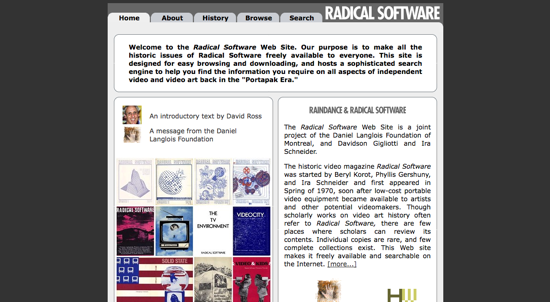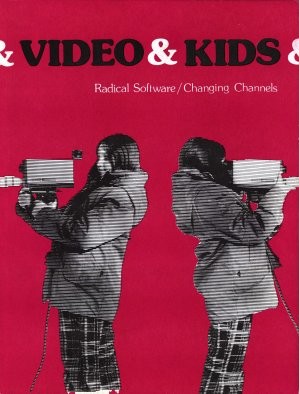
Image Credit: Screenshot from Radical Software
H/T: Chris Micklethwait
As Noel prepares to lead a Best Practices for Digital Images
workshop here at UT, the rest of us in the Visual Rhetoric group hope to make
some of this work public here on viz.
for others to use. One website
that presents some interesting work done in the 1970s that theorizes the use
and creation of digital/video media is Radical
Software.
Radical Software
was created, according to its website, out of the work of a group called the
Raindance Foundation which hoped to be “an alternative media think tank; a
source of ideas, publications, videotapes and energy providing a theoretical
basis for implementing communication tools in the project of social
change.” A part of this work
involved publishing a magazine called Radical
Software that discussed in various ways the power of technology
(principally video) to transmit diverse and alternative messages. What the creators of this website have
done is to scan all of the issues of Radical
Software (published between
1970 and 1974) as PDFs and make them available to the public for searching and
browsing.

Image Credit: Radical Software
What really struck me in looking over the website is the
relevance that some of their theorizing might have for individuals working in
education and digital humanities today.
Their last issue on “Video and Kids” features a number of individuals
reflecting on the ways in which they’ve used video in the classroom not only to
teach students material but also to show children ways of producing their own
work. This is something that the
Internet itself has further democratized as the tools required now for digital
interaction have become cheaper and the knowledge to use them is ready to hand. What also intrigued me is that Radical Software from the first viewed
their work as open-source and encouraged readers to copy freely from it. This more open attitude seems to mirror
the kind of work done today by publications like Kairos, which not only offer
space for more creative kinds of scholarship but also lower the wall preventing
the public from accessing it.
I found it fairly easy to
navigate the site and browse between issues, although having each article be
its own separate PDF on themakes it harder to read through an entire issue. (Luckily, they do have full issues in
PDF, but they're available only by clicking on the cover of the issue and not visible under the contents section, which makes this feature harder
to find.) The search itself is
also easy to use, although it appears that the articles haven’t been associated
with likely keywords: while a
search on “education” yields 155 results, “pedagogy” finds none. If there were any improvement that
could be made to this site, this would be helpful, but the website appears to
be designed—like the magazine itself once was—for easy access by others. I hope anyone interested in the
evolution of digital literacy and the use of technology will find this a useful
resource.


Recent comments
2 years 29 weeks ago
2 years 44 weeks ago
2 years 44 weeks ago
2 years 50 weeks ago
3 years 4 weeks ago
3 years 4 weeks ago
3 years 4 weeks ago
3 years 6 weeks ago
3 years 6 weeks ago
3 years 6 weeks ago